
Project Gutenberg's Daddy Do-Funny's Wisdom Jingles, by Ruth McEnery Stuart This eBook is for the use of anyone anywhere at no cost and with almost no restrictions whatsoever. You may copy it, give it away or re-use it under the terms of the Project Gutenberg License included with this eBook or online at www.gutenberg.org Title: Daddy Do-Funny's Wisdom Jingles Author: Ruth McEnery Stuart Illustrator: G. H. Clements Release Date: September 25, 2006 [EBook #19363] Language: English Character set encoding: ISO-8859-1 *** START OF THIS PROJECT GUTENBERG EBOOK DADDY DO-FUNNY'S WISDOM JINGLES *** Produced by Janet Blenkinship and The Online Distributed Proofreading Team at http://www.pgdp.net (This file was produced from images generously made available by The Internet Archive/American Libraries.)
NEW YORK
THE CENTURY CO.
1916
Copyright, 1910, 1911, 1912, 1913, by
The Century Co.
Published, October, 1913

To the Memory of those faithful brown slave-men of the plantations throughout the South, Daddy's contemporaries all, who during the war while their masters were away fighting in a cause opposed to their emancipation, brought their blankets and slept outside their mistresses' doors, thus keeping night-watch over otherwise unprotected women and children—a faithful guardianship of which the annals of those troublous times record no instance of betrayal.
In presenting a loyal and venerable ex-slave as an artless exponent of freedom, freedom of conduct as well as of speech, the author of this trivial volume is perhaps not composing an individual so truly as individualizing a composite, if the expression will pass.
The grizzled brown dispenser of homely admonitions is a figure not unfamiliar to those who have "moved in plantation circles" in the cotton and sugar country, and touched hands with the kindly dark survivors of the old regime.
If the man, Daddy Do-funny, was unique as an individual, perhaps in the very fact of an individuality unembarrassed by the limitations of convention, of education and of precedent, he becomes in a sense typical of his people and of his time.
Of course, a man is not called Do-funny for nothing, not even playfully and in the free vernacular of rusticity at its freest.
One of a small community of superannuated pensioners upon the bounty of their former owners, Daddy was easily first citizen of Evergreen annex on Crepe Myrtle plantation, which is to say he was therein a personage of place and of privilege, coming and going at will, doing as he pleased, and as, with uplifted eye, he reverently boasted, "sponsible to nobody but Almighty Gord for manners and behavior."
Even so late as this year of grace, a full half century after "emancipation," there are still to be found on many of the larger plantations in the far South a few such members of the order of the Rocking-chair, whose records of "good and honorable service" reach back through periods of bondage, even such kindergartners as septuagenarians in the privileged class, having clear title to nearly a quarter of a century of slave memories; not to mention the occasional centenarian with even his semi-occasional uncle or father poking around, toothless [Pg 6]and white-plumed dignitaries, these, sometimes with leaders, being blind, but ever important in pride of association and memory.
It is something even if one is bent double and may never again behold the light of day, to be able to reach back into a dim and forgotten past and to say, "I remember," especially when the memory recalls days of brilliance and of importance.
But Daddy's place among the gentle Knights and Ladies of the Rocking-chair was far and away above such as these whose thoughts, alert though they were and loyal, travelled forever backward to the sweet but worn fields of memory where every pleasure is a recognition and fashions do not change—a restful retreat for dreamers whose days of activity are done.
But Daddy's mind worked forward and upward and although he did not know the alphabet excepting by rote, a common ante-bellum plantation accomplishment, and while professing high contempt for what he called "cold shelf-knowledge," his reputation for wisdom, wisdom as gleaned in observation and experience and "ripened by insight," was supreme, while his way of casually tossing it off in bits in playful epigram finally gave the word its plural form so that the expression "Do-Funny Wisdoms" came into familiar use.
As an example of his rambling talk, much of which seems at least semivagarious on transcription, I recall one of his meandering dissertations on the value of experience as superior to observation.
Several of the old people, his neighbors, had joined the listening children who surrounded him under the fig-tree, and perhaps he unconsciously deferred to them in his accent of their common possession in length of days, although he gave no sign of heed to any audience, when he said:
"Dey's mighty few facts de same behind an' befo', not to say inside an' outside, and a man can go roun' an' roun' de blackberry bush an' not git nowhar. 'Spe'unce is a thorny bramble, an' yer 'bleeged to go th'ough it, to draw blood, an', I tell yer, de blood is de life!"
Although this tribute brought grunts of approval from the gray heads, Daddy was soon off at a tangent in playful fancy, hitting off[Pg 7] a foible or "celebrating truth and justice" in one of the unconscious epigrams which it is sought herein to preserve, even when having occasionally to hammer them into shape, for, while Daddy was almost unerring in rhyme, his rhythm, never at fault in delivery, was strictly a temperamental matter, not adequately renderable in cold print.
But more than as philosopher, satirist or seer was the old man distinguished as a social factor on the place. Wherever his chair was set, there were the children gathered together, both black and white, eager listeners to his quaint pictorial recitals, even seeming to cherish the "Wisdoms" which fell from his tongue, as is not a common way with children, who seem instinctively to spurn the obviously didactic.
But Daddy's moralizing, besides its saving grace of imagery, was generally sequential and convincing; while his repartee, to use a word which seems almost a misfit in this rural setting, had a way of hitting the mark and striking fire, as when, in reply to the question from a forth-putting youngster on one occasion, "Where do you keep all your wisdoms, Daddy?" he snapped:
"In my ole toof holes, dat's whar! Wisdoms don't ripen good tel yo' toofs is ready to drap out. Ev'rybody knows dat Gord A'mighty ain't nuver is set but one live Wisdom-toof in a man's mouf—an' dat comes late an' goes early."
And then he added with a mischievous smile:
"You-all smarty undergrowth, you ain't chawed life yit. You jes 'speramintin' wid yo' milk-toofs.
"Now's yo' havin' time, chillen, but to have an' to lose, dat's life!
"Study wisdom now an' minch on it good wid yo yo'ng baby toofs an' hol' fas' to it, so's it'll meller down ripe, time de caverns opens for it.
"But look out! I knows a lot o' ole vacant wisdom caves for rent behin' dis crepe myrtle hedge—so, I say, watch and pray! Pray for insight an' outsight! An' even so, dey's some wisdoms so fine you can't see 'em tel you nearin' Home an' livin' on de far side o' life!"
Daddy lived alone in a tiny vine-clad cabin and there were times when he seemed frail and to need care, and the doctor said[Pg 8] he was rheumatic. This, however, he denied, declining companionship while he insisted that the sharp pains which occasionally twisted his brow were only growing pains which he was glad to endure as not having got his growth in his first childhood, he was "'bleeged to wrastle wid it in de second," and, "of course," he added, "it comes harder when a man's bones is set."
On days when his pains were bad, he would propel himself around in a roller-chair, which he called his chariot; and although evidently suffering, he was never heard to complain. Once, when he seemed almost helpless, some one asked him how he had got into the chair, and was quickly silenced by his ready answer, "Gord lifted me in!"
Now, to Daddy clothes were clothes. In dress as in manners, he knew no obligation of precedent; and as to fashion, the word made him chuckle.
When his pains were unusually severe and it was difficult for him to get into his own garments, he did not hesitate to clothe himself in one of the flowing wrappers which his old wife, Judy, long since dead, had worn.
And thus it happened that while on some days an aged man might have been seen hobbling about, working among his plants, on others there appeared to be an old woman propelling herself around in a rolling chair; and seeing her, his neighbors, with perhaps a chuckle, would remark, "I see Daddy Do-funny is laid up ag'in!"
Another peculiar habit of the old man was the way in which he took his bath—a dangerous process, one would think, for a rheumatic, but harmless, no doubt, to growing pains. Seeing the rain coming, he would exclaim: "Gord sendeth de rain! He's offerin' me a bath—just or unjust!" Then donning his "bath-slip," an old wool wrapper of Judy's and getting into his roller-chair, he would wheel out and sit calmly in the shower, often closing his eyes and lifting his face as he exclaimed: "Bless Gord for de sweet drops! Bless Gord for de rain!" and when he had had bath enough, he would either put up his umbrella or roll his chair indoors as he felt inclined.[Pg 9]
But perhaps we cannot get nearer the soul of the old man than by recalling a conversation which occurred during an invasion of the children, a conversation between him and his guests which is thrown into a sort of rhyme for easy memorizing, passing from one speaker to another without more than the natural pause for reply.
Obviously, the children began it:
"Ol' Daddy Do-funny,
How do you come on?"
"Po'ly, thank Gord, honey,
Po'ly dis morn.
My ol' spine it's sort o' stiff,
An' my arms dey 'fuze to lif'.
An' de miz'ry 's in my breas',
An' I got some heart-distress.
An' de growin' pains dey lingers,
In my knee-j'ints an' my fingers,
But I'm well, praise Gord, dis mornin'."
"Ol' Daddy Do-funny,
What cuyus talk!
How is you well, when you
Can't even walk?"
"Hush, you foolish chillen, hush!
What's dat singin' in de brush?
Ain't dat yonder blue de sky?
Feel de cool breeze passin' by!
Dis ol' painful back an' knee,
Laws-a-mussy, dey ain't me!
I'm well, praise Gord, dis mornin'!"
One asks for sun, an' one for rain, | |
Ef de hoa'se ol' rooster wouldn't crow so loud | |
Sis' Butterfly aimed to work all right, | |
She's a citizen-bird, Sis little brown Wren,
She nests in de spring an' de fall again;
"Race suicide" talk nuver fazes her,
'Ca'ze she's good for 'er ten little wrens a year.
An' she ain't by 'erself, my ladies, in dat—
No, she ain't by 'erself in dat.
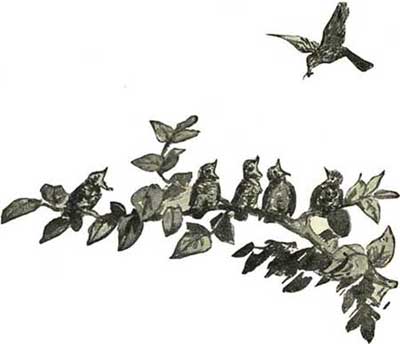
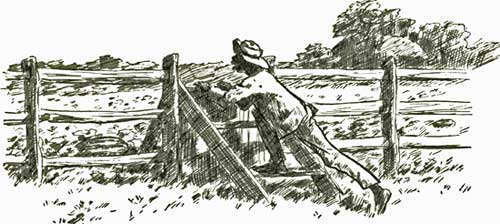
Oh, Watermilion sho' is good to eat!
But de darkie rates it twice-t mo' sweet,
'Ca'ze it's ap' to b'long to de yether man,
An' it's mighty hard to lif' by sleight o' han'.
An' it ain't by itself, made sweet like dat—
No, it ain't by itself like dat.
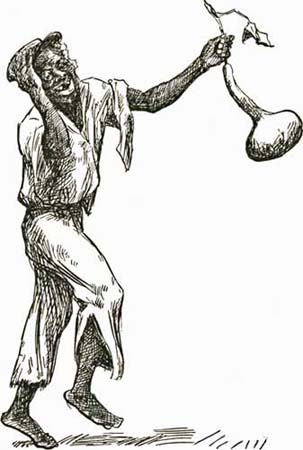
De green gou'd on de sunny shed
Was mighty proud of his pethy head,
So he nuver pondered or studied or trained,
An' now he's ol' an' rattle-brained.
An' he ain't by 'isself in dat, in dat--
An' he ain't by 'isself in dat.
| |
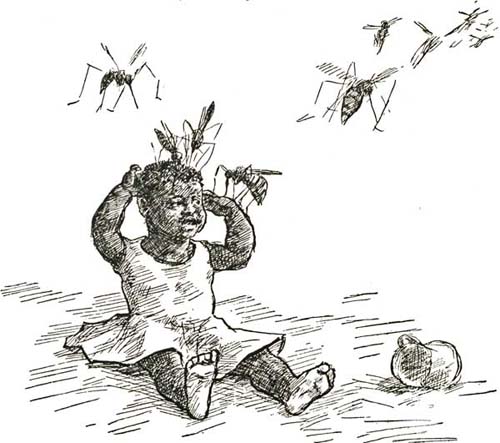
Wid so much Christian blood in 'is veins,
You'd think Br'er 'Skitty would take some pains
To love 'is neighbor an' show good will,
But he's p'izenin' an' back-bitin' still.
An' he ain't by 'isself in dat, in dat—
No, he ain't by 'isself in dat.
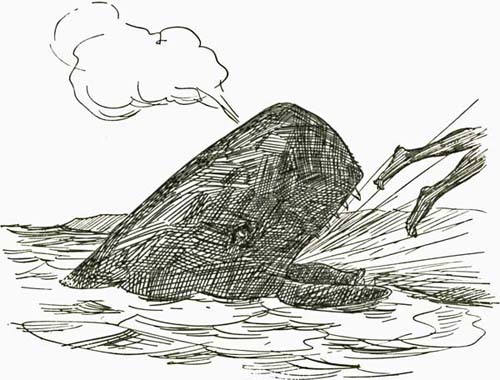
Dat whale wha' gulped Br'er Jonah down
Was bleeged to swim close-t to de groun'
Ontel he riz up an' confessed
He'd swallered mo' 'n he could digest.
But you ain't by yo'self, Br'er Whale, in dat—
No, you ain't by yo'self in dat.
[Pg 26]
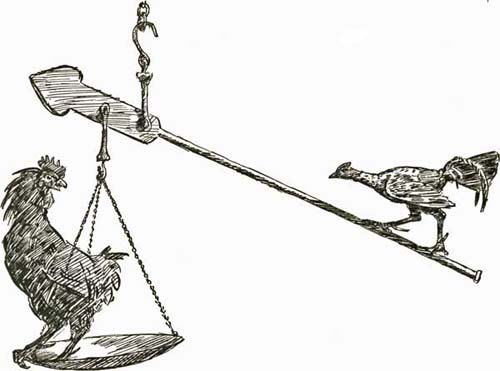
Dey's some things square an' some things round,
An' little game cocks ain't sol' by de pound;
Dey's weighed by sand an' pluck an' grit
An' de number o' dead dey leave in de pit.
An' dey ain't by deyselves in rank like dat—
No, dey ain't by deyselves in dat.
[Pg 27]
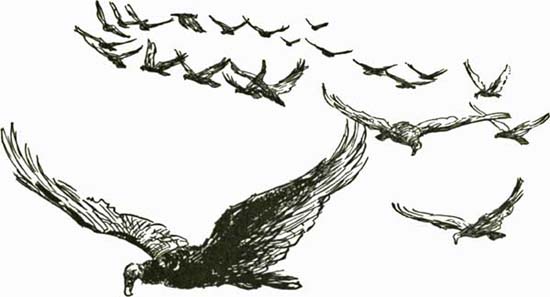
Ef you keep yo' eyes on Br'er Carrion Crow,
You'll wonder huccome he kin carry on so!
He flies in high circles an' chooses meat
Dat no honest workin'-man would eat.
An' he ain't no new high-flyer in dat—
No, he ain't by 'isself in dat.
[Pg 28]
Ef you quiz Br'er Mule, you'll find dat he | |
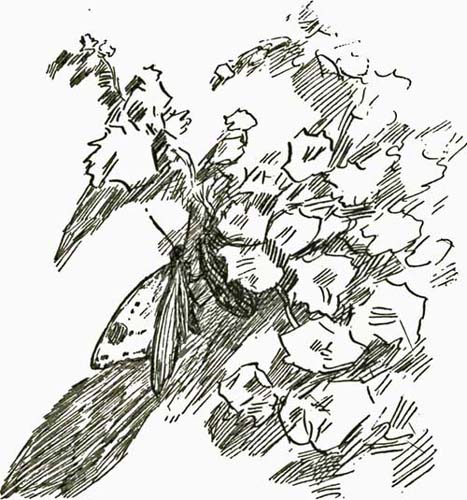
Br'er Grubworm wrops 'isself in twine
An' swings in 'is shroud on a evergreen vine,
Becaze it's mortal death dat brings
His on'iest chance to git 'is wings.
But you ain't by yo'self, Br'er Worm, in dat—
Oh, you ain't by yo'self in dat.
[Pg 30]
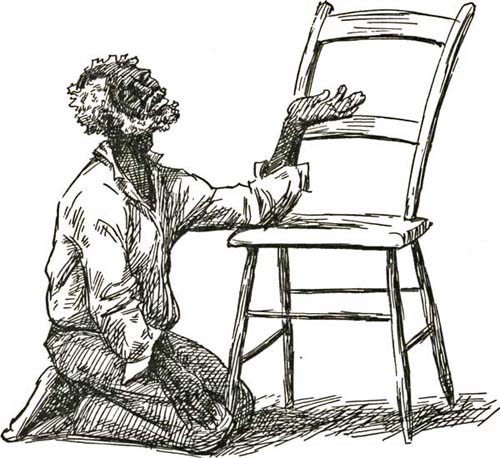
Ol' Mingo, on 'is knees, he say:
"Lord, teach dis nigger how to pray,
Else riconcile two kinds o' weather
For craps an' rheumatiz together!"
But you ain't by yo'self, ol' man, in dat—
Oh, you ain't by yo'self in dat.
| |
Dey say dem Sparrers come crost de seas | |
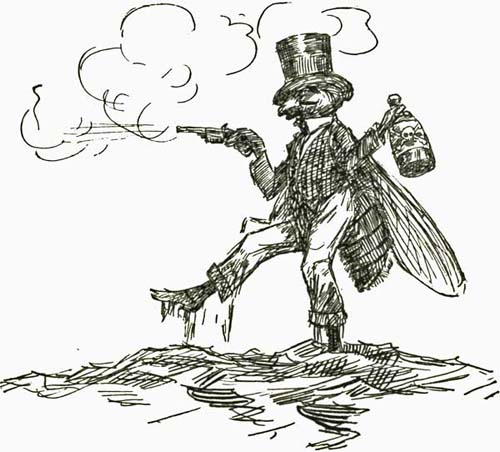
Wid dem suctious foots, seem lak Br'er Fly
Mought draw down health ef he trod de sky;
But he's so onpartic'lar whar he roams
Dat he's got 'isself screened out o' quality homes.
An' he ain't by 'isself outcas' like dat—
No, he ain't by 'isself in dat.
Little yaller fluff-ball, one day out,
Steps mighty high while he picks all about;
Never sees de egg-shell layin' in 'is track,
Much less the little piece stickin' on 'is back.
But he ain't by 'isself in dat, in dat—
But he ain't by 'isself in dat.

Br'er Scare-crow's built to suit 'is job
Wid flappin' legs an' arms dat bob;
He ain't got brains for discontent
So he works widout no argument.
An' he ain't by 'isself in dat, in dat—
No, he ain't by 'isself in dat.
[Pg 36]
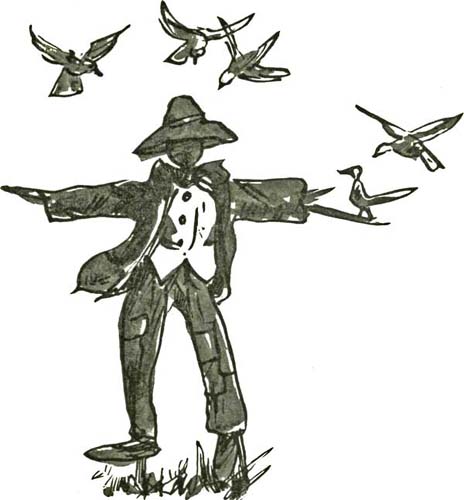
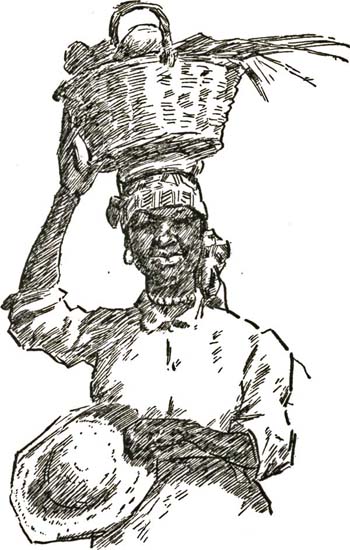
Dey's a sweet plantation, yaller-buff rose
Dat in my ricollection grows;
In my ol' dreams she seems to wait
Whar she stood an' bloomed by de love-vine gate
An' I ain't by myself in dreams like dat—
No, I ain't by myself in dat.
[Pg 37]
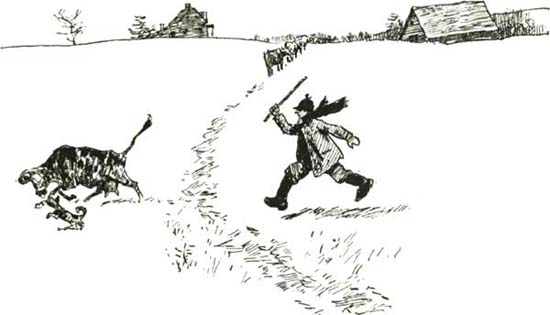
Sis' Twis'-horn Brindle is a bothersome cow,
She's boun' to raise a ruction an' she don't keer how;
She craves to be de bell-cow an' lead off wid a clang,
So it's all a man kin do to make 'er gallup wid de gang.
An' she ain't by 'erself in dat, in dat—
An' she ain't by 'erself in dat.
[Pg 38]
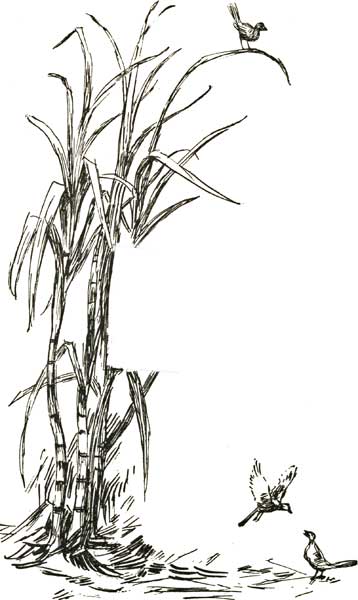
De sugar-cane stands so proud an' smart,
You'd nuver suspicion it sweet at de heart,
But to prove its sweets it yields its will
To be tried by fire an' ground in de mill.
An' it ain't by itself in dat, in dat—
No, it ain't by itself in dat.
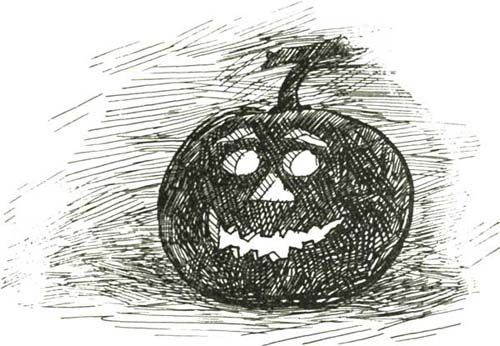
Sence he los' 'is brains to git 'is smile,
Brer Jack-o-lantern grins lak a wilderin' chile
Widout no secrets out or in;
An' de lighter in de head de broader 'is grin
An' he ain't by 'isself in dat, in dat—
An' he ain't by 'isself in dat.
[Pg 40]
| |
Ef de Wul o' de Wust would cuss an' swear
An' take some shape, an' rip an' tear,
It wouldn't sen' col' chills down a nigger's spine
Like de changeable expression of a mystery shine.
An' it ain't by its ghostly self in dat—
No, it ain't by itself in dat.
[Pg 42]
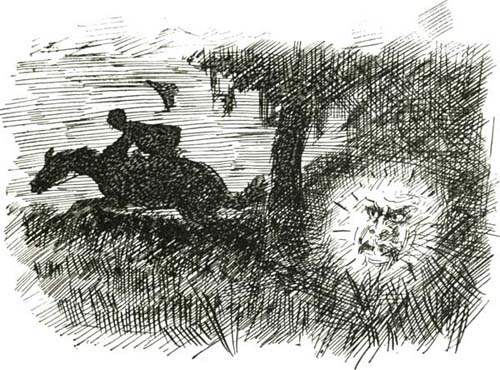
De blind mole tunnels straight ahead, | |
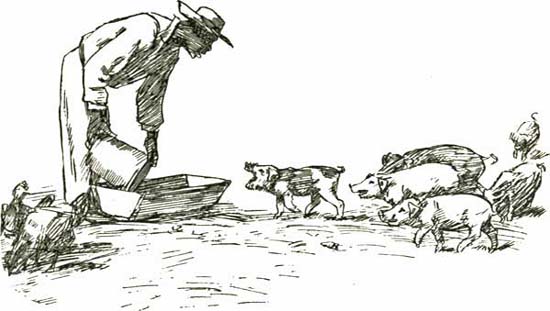
You'll sometimes trace de loudes' grunt
In de horg-lot down to de littles' runt,
Lak as ef he'd 'nounce whilst he gulps 'is swill,
"A pompious horg is as big as 'is will."
An' he ain't by 'isself in dat, in dat—
No, he ain't by 'isself in dat.
[Pg 44]
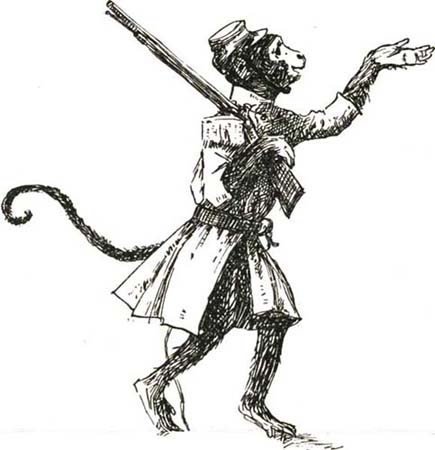
De organ plays an' Br'er Monkey struts,
An' he takes high pride in de capers he cuts,
While folks draps picayunes into 'is han'
For fallin' so short o' bein' a man.
An' he ain't by 'isself, misled like dat—
No, he ain't by 'isself in dat.
[Pg 45]
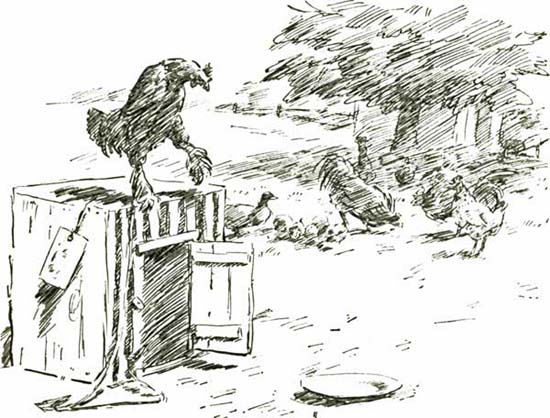
Dat three-name chicken wid de feathery legs
Wha' 'merged f'om de ten dollar settin' of eggs,
Is a lonesome bird an' I s'picion he frets
'Ca'ze he can't outgrow dem pantalettes.
An' he ain't by 'isself in dat, in dat—
An' he ain't by 'isself in dat.
[Pg 46]
Br'er Crawfish th'ows a racklass bluff,
An' he sho do look like fightin' stuff;
But turn 'im loose on a battle-groun',
An' he'll bow 'isself out, an' nuver turn roun'.
But he ain't by 'isself in dat, in dat—
But he ain't by 'isself in dat.
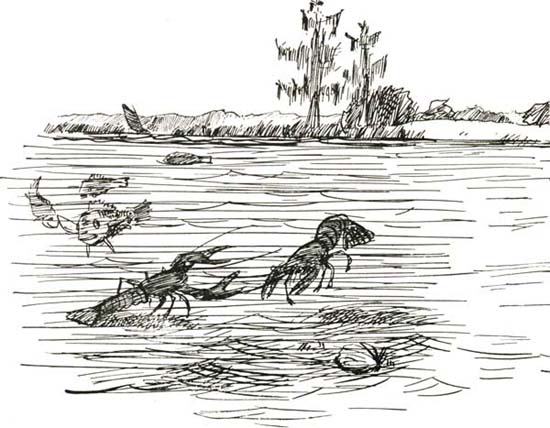
"I could stand de hook," says de angleworm,
"An' a lily-brook wouldn't make me squirm,
But I can't help wrigglin' ag'in' my fate;
It breaks me all up to be used for bait."
An' he ain't by 'isself in dat, in dat—
An' he ain't by 'isself in dat.
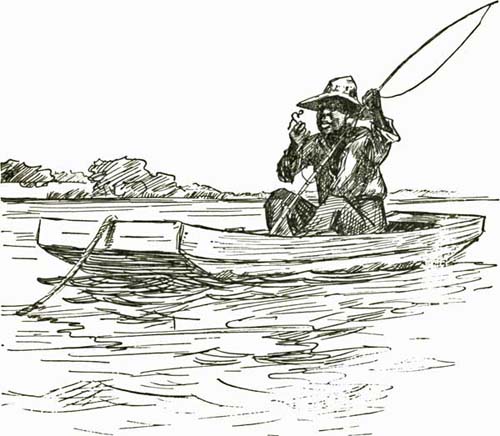
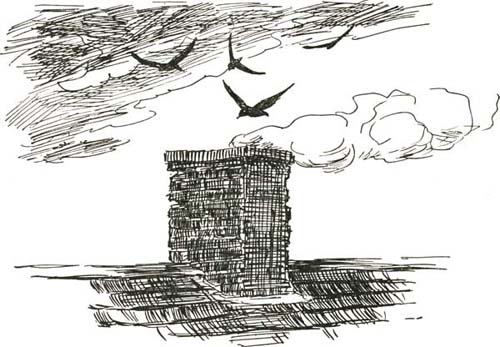
Wid 'is nest in de flue whar de suctions blow,
Storms due above an' fire below,
No wonder Br'er Swaller sags an' sways
Like a pusson ableeged to dodge bofe ways.
An' he ain't by 'isself in dat, in dat—
An' he ain't by 'isself in dat.
[Pg 49]

Little picaninnies, fishin' in de doodle-bug holes.
Wid a "spit for luck," an' straws for poles,
Show pyore delight in de fisherman's aim
All disp'opo'tioned to de game.
An' dey ain't by deyselves in dat, in dat—
An' dey ain't by deyselves in dat.
Sis' Porcupine, wid 'er bristles all set
In a pompado' style, is waitin' yet,
An' she can't understan', whilst she puckers 'er mug,
De sca'city o' kisses an' de absent hug.
But she ain't by 'er lonesome self in dat—
No, she ain't by 'erself in dat.

| |
Sis' Tin-cage Polly wid de roamin' nose | |

Br'er Rattle-snake rattles befo' he springs,
But he warns too late to 'scape 'is stings;
His high-class manners don't count for much
'Ca'ze dey grafted on to a sarpent's touch.
An' he ain't by 'isself in dat, in dat—
An' he ain't by 'isself in dat.
[Pg 54]
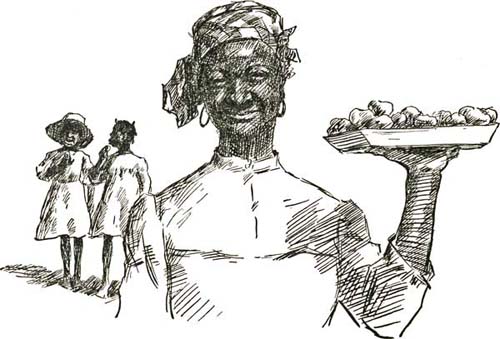
Is you little gals, growin' into women,
Ever tasted a snappy young persimmin?
It takes a hard frost to make it sweet,
An' it's ol' an' swiveled 'fo' it's fit to eat!
But it ain't by itself, sharp chillen, in dat—
No, it ain't by itself in dat.
[Pg 55]
Dat flee-bitten mule an' my bay mare
In de hay-wagon, sho is a mixtious pair;
But dey's pulled so long th'ough wind an' weather
Dat out in de field dey graze together.
An' dey ain't by deyselves in dat, in dat—
An' dey ain't by deyselves in dat.
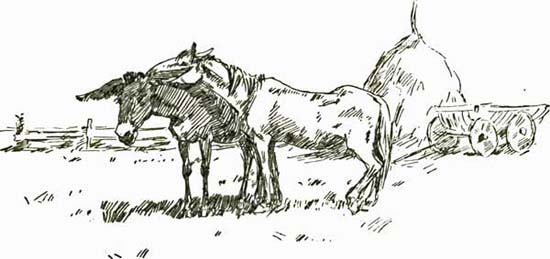
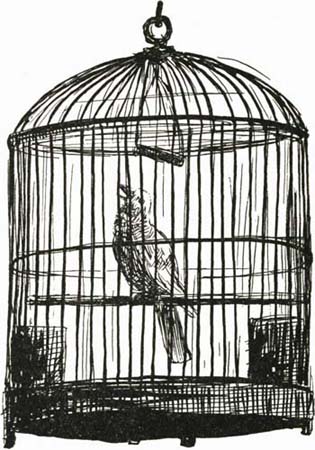
De little yaller cage-bird preems 'is wings
An' he mounts 'is pyerch an' sings an' sings;
He feels 'is cage, but I s'pec' he 'low
To take what comes an' sing anyhow!
An' you ain't by yo'self, little bird, in dat—
No, you ain't by yo'self in dat.
[Pg 57]
Br'er Pole-cat's got a s'ciety smile
An' he sho is dressed in scrumptious style,
But he keeps 'is own hat off de quality rack
By de scan'lous way he answers back.
But he ain't by 'isself in dat, in dat—
But he ain't by 'isself in dat.
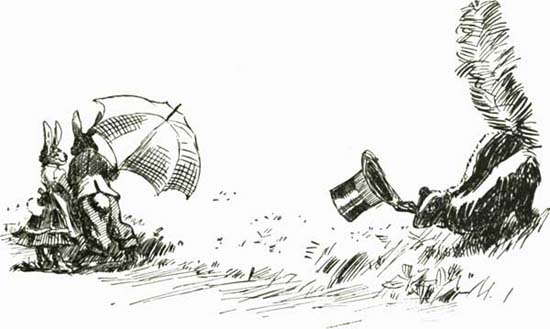
It ain't how many eyes you got,
'Les' needles could see an' potatoes, too;
An' "hookin' a' eye," as like as not,
Would be classed as a sin dat no lady'd do.
But it's keepin' yo' eyes turned to'des de right,
An' to'des de wrong jes' shettin' 'em tight—
Lookin' out for ways to be polite—
Dat's de way my lady'd do!
It ain't how many ears you got
Dat makes you listen an' learn an' do;
Else a hill o' corn in a garden plot
Would be 'way ahead o' me an' you;
But it's shettin' yo' ears to heartless speech,
An' listenin' whilst de teachers teach,
An' strivin' to practise mo' 'n to preach—
Dat's de way my lady'll do!
It ain't how many tongues you got,
'Les' shoes would talk an' wagons, too;
An' all de bells would gabble a lot,
An' tattle an' brag de long day th'ough;
But it's gyardin' yo' tongue f'om talk dat's wrong,
An' passin' a helpful word along,
An' maybe singin' a hopeful song—
Dat's de way my lady'll do!
[Pg 59]
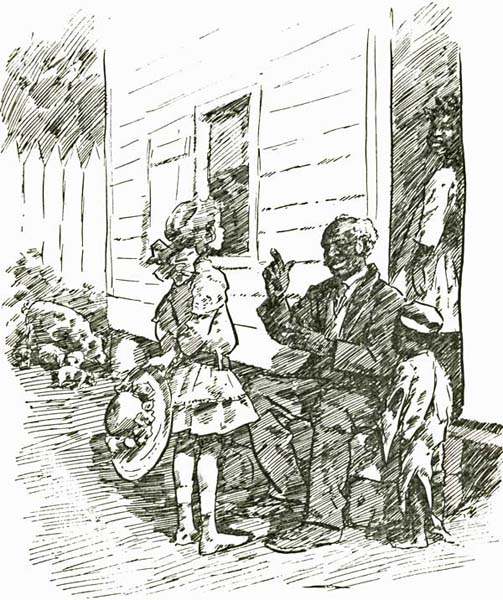
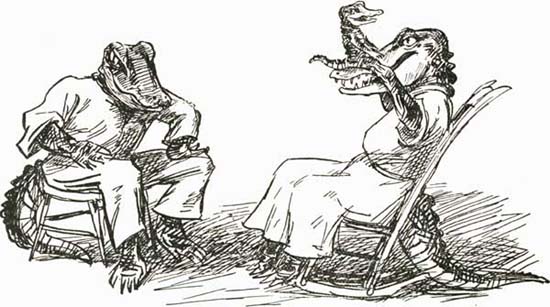
Said de mammy alligator, wid a motherly grin:
"I nuver liked babies wid dey dimples tucked in,
But our little pet, wid its horny hide,
Like its mammy's an' its daddy's, is de fam'ly pride."
An' dey ain't by deyselves in dat, in dat—
An' dey ain't by deyselves in dat.
[Pg 61]
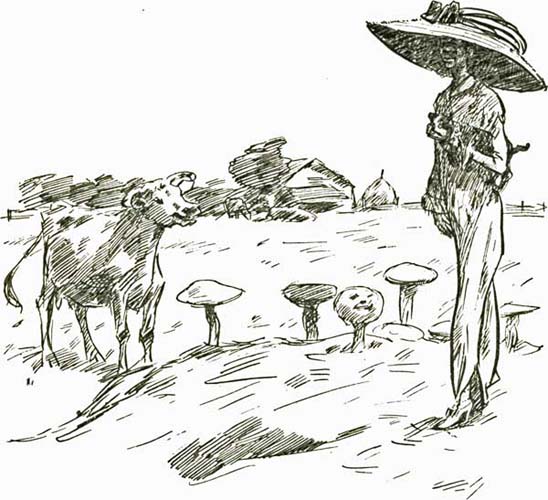
Sis' Mush A. Roon sprung up over night
An' to name whar she sprung f'om ain't polite;
But she spreads 'erself wuss'n me or you,
An' wid on'y one foot to stan' on, too.
An she ain't by er new-come self in dat—
No, she ain't by 'erself in dat.
[Pg 62]
Cunnin' little donkey-baby—
"Ye-haw! Ye-haw!" What a funny laugh!
Soun' jes like a creaky, cranky
Seesaw—seesaw!
Wasn't nothin' funny roun' dat
We saw—we saw!
'Tel we glimpsed de stagger-gait dat
He saw—he saw!
Brindle strikin' swagger-gait when
She saw—she saw—her wibbly wabbly calf!
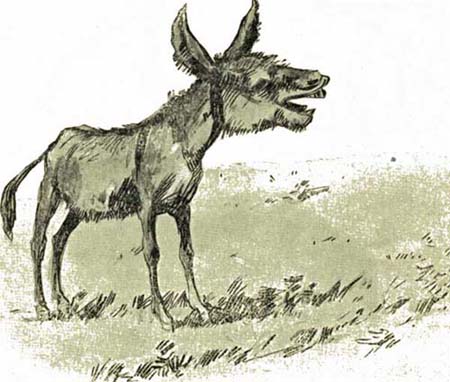
Den we j'ined wid Mister Donkey,
"He-haw! He-haw!" How we-all did laugh!
But we laughed at some'h'n' mo' dan
He saw—he saw!
Donkey couldn't see de ears dat
We saw—we saw!
Rabbit lopin' down de road, we
Three saw—three saw!
Wagged his ears an' called him daddy!
"Haw-haw! Haw-haw!" How dat—who dat laugh?
An' de last to see de joke was wibbly wabbly calf!
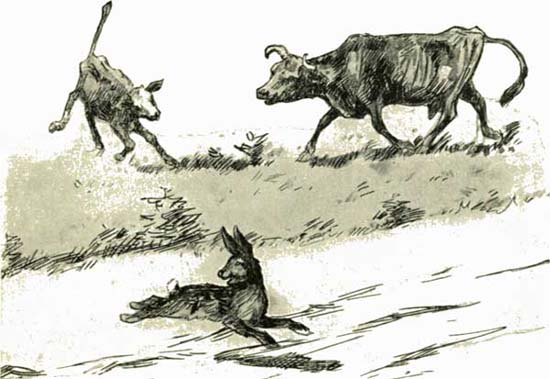
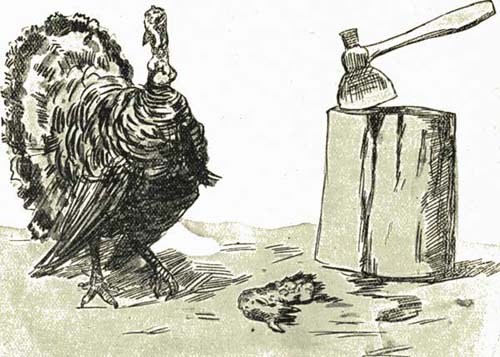
Ol' Gobbly struts aroun' de stable
An' th'ows out hints o' de rich man's table,
An' he h'ists his tail an' spreads it wide,
To display his cuyus graveyard pride.
But he ain't by 'isself in pride like dat—
But he ain't by 'isself in dat.
[Pg 65]
When de cabbage got ambitiom, in a uppish hour
An' lost 'is head an' bu'st into flower
Wid 'is brains outside, an addled, at dat—
He sot 'isself up for a 'ristocrat.
An' he ain't by 'isself in dat, in dat—
An' he ain't by 'isself in dat.
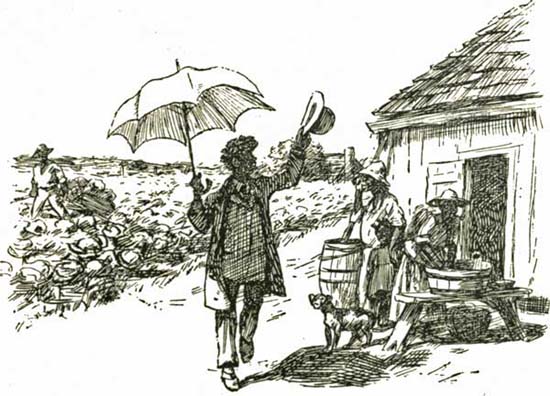
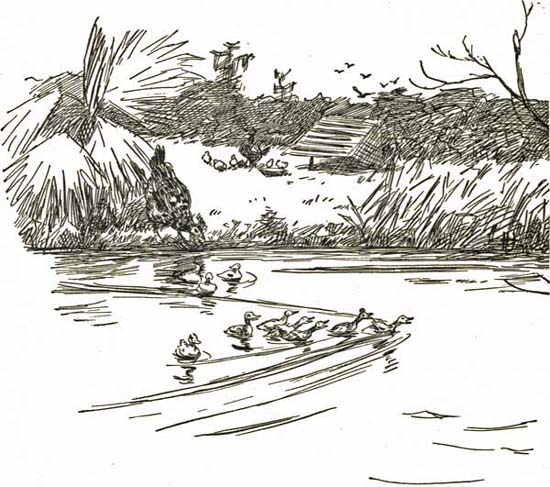
Sis' Dominick follers her brood o' ducks
To de bayou's edge, an' she clucks an' clucks:
'Dis stepmammy job, oh me, oh me!
Ain't all dat it's quacked up to be!"
But she ain't by 'erself in dat, in dat—
But she ain't by 'erself in dat.
[Pg 67]
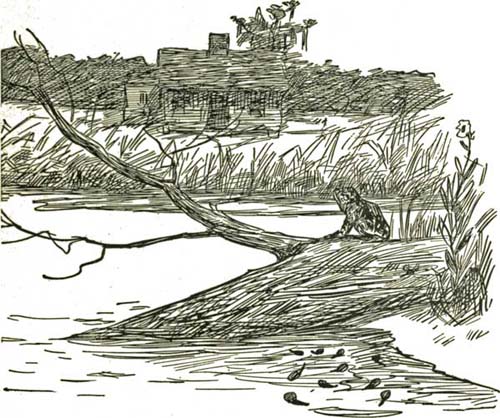
Ol' Br'er Frog ain't much to sing,
But he clairs a log in a single spring,
An' jedgin' 'im by his bigoty ways,
He's clean forgot 'is tadpole days!
But he ain't by 'isself in dat, in dat—
But he ain't by 'isself in dat.
[Pg 68]
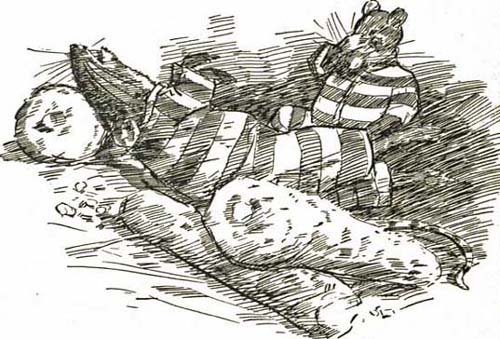
Br'er Rat in de corn-bin over-fed
An' under-worked, an' now he's dead;
He craved to live lak a bloated chief,
An' now he ain't nothin' but a ol' dead thief.
An' he ain't by 'isself in dat, in dat—
No, he ain't by 'isself in dat.
[Pg 69]
Br'er mockin'-bird sings in de live-oak shade, | |
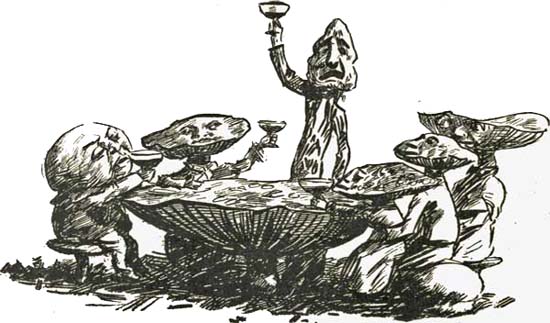
Dey's many a musharoon good to de tas'e
An' rich for de table, dat goes to was'e
'Ca'ze folks don't dast to gether it in
For de way it favors its dung-hill kin.
An' it ain't by itself condemned like dat—
No, it ain't by itself in dat
[Pg 71]
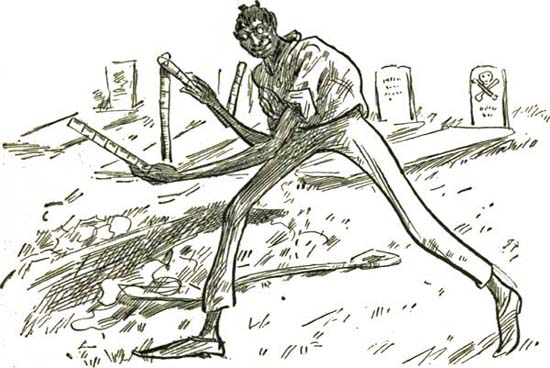
When Br'er Measurin'-worm strikes out so brave,
Makin' tend he kin measure you for yo grave,
Wid all 'is stride an' all 'is stren'th
He can't measure mo'n 'is own little len'th.
An' he ain't by 'isself made cheap like dat—
No, he ain't by 'isself like dat.
[Pg 72]
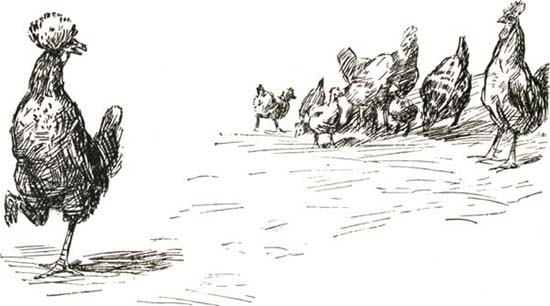
Hit's a proper pride in Sis' Top-knot's breast
Dat makes 'er step to march 'er crest;
Yit jalousy follers 'er 'roun' de shed
On de count o' dat innercent tufted head.
An' she ain't by 'erself pursued lak dat—
No, she ain't by 'erself in dat.
[Pg 73]
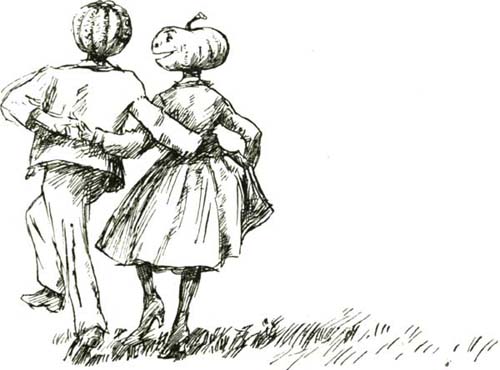
De cantelope gits mighty bilious
F'om runnin' wid punkins too familias,
So it's banished out for its sociable sin
Along wid its yaller kitchen kin.
An' it ain't by itself in dat, in dat—
An' it ain't by itself in dat.
Br'er 'Possum makes pertend he's dead
Whilst shots goes whizzin' over 'is head.
But time de hounds is out o' sight,
He's up an' "hongry for a fight!"
An' he ain't by 'isself in a bluff like dat—
No, he ain't by 'isself in dat.
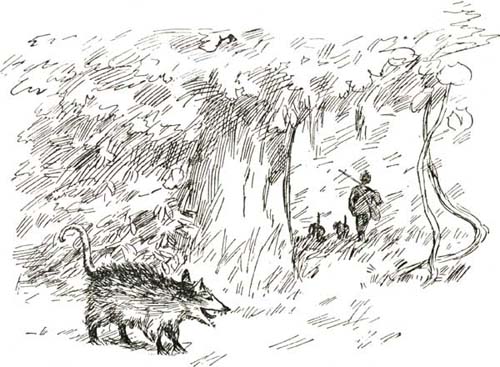
| |
De camelia-lizard is a turn-coat man,
An' he borries his colors where dey's "room to stan'";
He mought keep solid as a county candidate,
But you couldn't sca'cely find 'im on a map o' de State.
But he ain't by 'isself lost out, like dat—
No, he ain't by 'isself in dat.
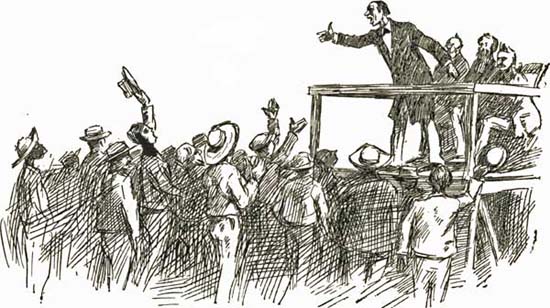
Whilst she eats de groun' f'om onder 'er feet,
Sis' Caterpillar's weavin' 'er windin'-sheet;
But 'er red eyes shine an' 'er grass-green-hair,
An' 'er short life's bright, so she don't care.
An' she ain't by 'erself in dat, in dat—
An' she ain't by 'erself in dat.
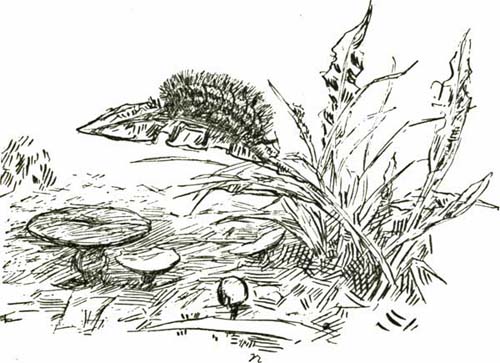
Ol' Dr. Drake wid 'is college waddle
An' Latin inscriptioms on 'is noddle,
Would part wid 'is gait an' 'is shimmerin' back
To perscribe a crowin'-powder an' nuver say "Quack!"
But he ain't by 'isself in dat, in dat—
But he ain't by 'isself in dat.
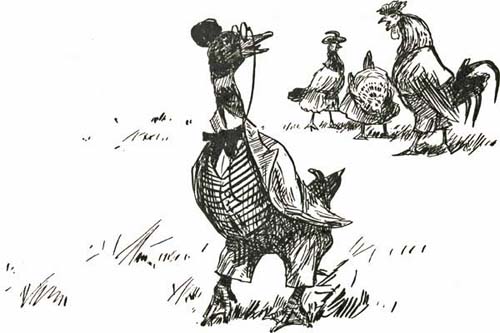
Br'er Peacock 'lows he's a 'ristocrat,
Wid mighty fine clo'es, an' vain at dat;
He'll answer yo' glance wid col' surprise
An' look you over wid a thousan' eyes!
But he ain't by 'isself in dat, in dat—
But he ain't by 'isself in dat.
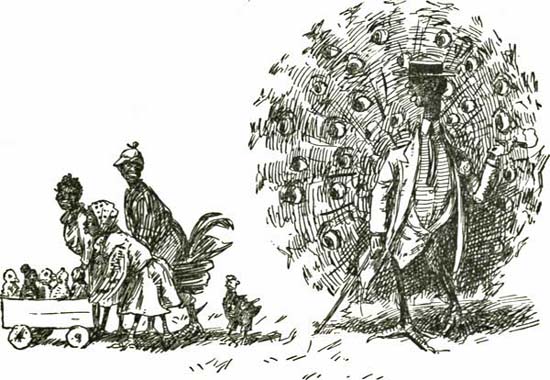
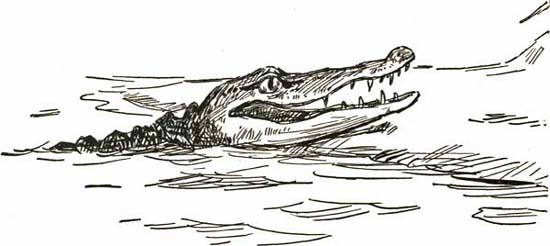
Br'er Alligator kin grin a mile,
But dey ain't no inducemint in his smile;
Whilst he ain't no race-horse, yit dey say
A little alligator goes a mighty long way.
But he ain't by 'isself in dat, in dat—
But he ain't by 'isself in dat.
[Pg 81]
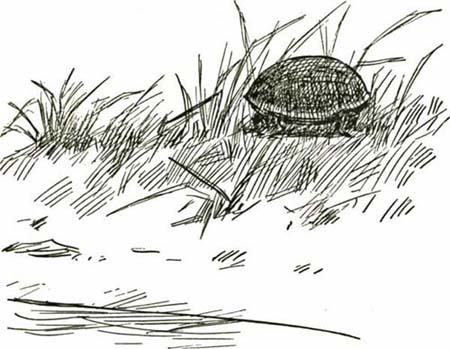
Br'er Tarrapin draws in 'is head so knowin',
You can't tell whether he's comin' or goin',
But his mind ain't mixed—he's layin' low
Tel he sees which way he's obleeged to go.
An' he ain't no new politician in dat—
No, he ain't by 'isself in dat.
[Pg 82]
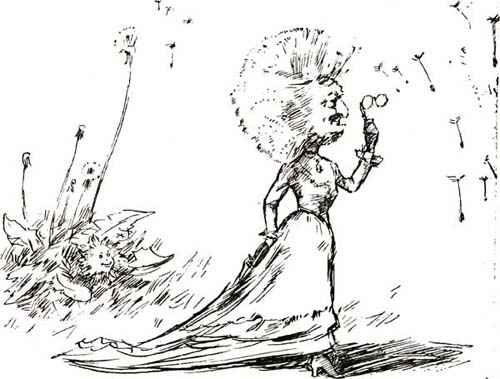
De dandelion flower blooms out so young
Wid a look in its face like a sassy tongue,
Den it grows light-headed wid self-conceit
Wid a flighty ol' age, for full defeat.
An' it ain't by itself, pert chillen, in dat—
No, it ain't by itself in dat.
[Pg 83]
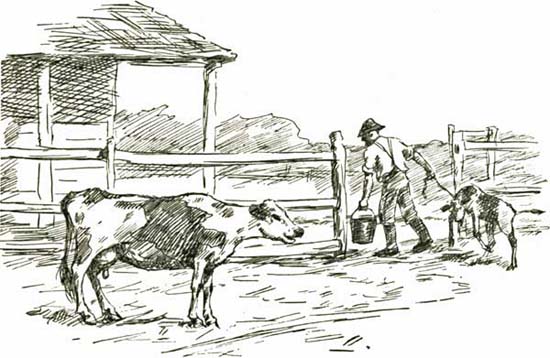
"Life's give an' take," Sis' Cow, she laugh.
So I gives my milk an' dey takes my calf."
An' when contentment's hard to fin',
She chaws 'er cud to ease 'er min'.
And you ain't by yo'self, Sis' Cow, in dat—
No, you ain't by yo'self in dat.
[Pg 84]
Br'er Donkey, drinkin' at de brook,
Surveys hisself wid offish look,
An' 'low: "You Jackass makes too free!
Huccome you dast to drink wid me!"
An' he ain't by 'isself in dat, in dat—
Oh, he ain't by 'isself in dat.
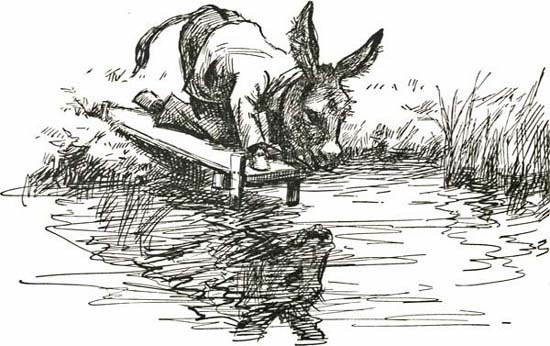
De purty yaller goslin's say:
"Oh, what—oh, what's de use!
When Mama say, 'Come, walk dis way
An' ac' jes like a goose!'
Oh, what's de use—oh, what's de use?
I's boun' to grow a noddle,
Like every goosey, goosey, goose,
An' waddle, waddle, waddle!
"But Mama say: 'Don't talk dat way!
Come, waddle like a mild goose,
F'om side to side, wid proper pride—
Not like a woodsy wild goose!
Dey's plenty use—dey's plenty use!
Come, git yo' education!
See how to waddle an' tote yo' noddle
Accordin' to yo' station!'"
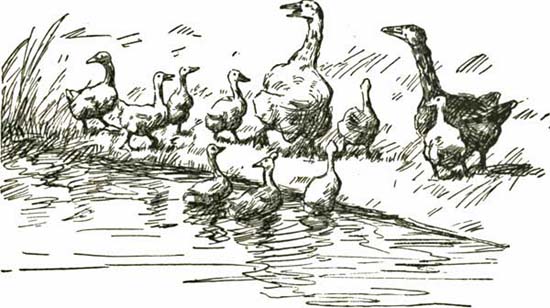
De little white chicken dat's petted too much
Gits stunted in growth f'om de sp'ilin' touch.
An' she'll nuver make a hen so brave an' good
As ef she went a-pickin', an' worked wid de brood.
An' she ain't by 'erself in dat, in dat—
No, she ain't by 'erself in dat.
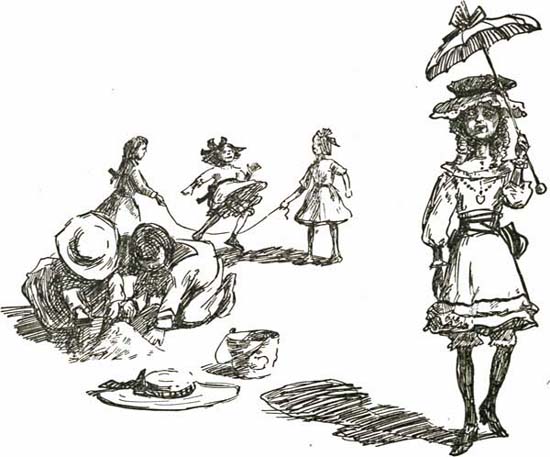
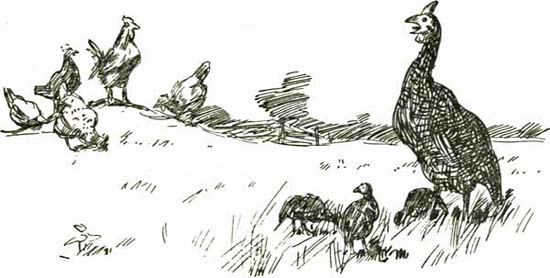
Sis' Guinea, in proud week-day clo'es
Forgits how she was hatched outdo's;
Wid 'er red boot chicks, she cuts a dash,
An' calls 'er neighbors "Po' trash! Po' trash!"[1]
But she ain't by 'erself in dat—
But she ain't by 'erself in dat.
[Pg 88]
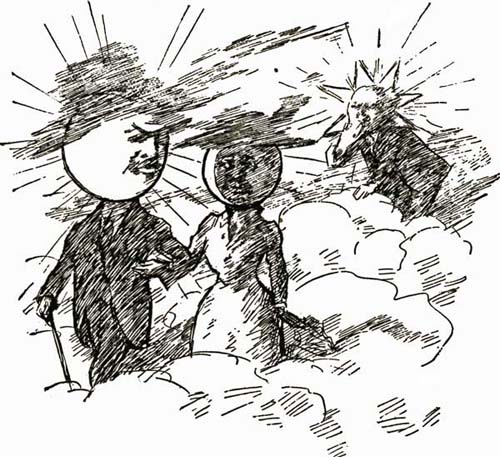
Dey say Sis' Moon daresn't shine at night
Cep'n by Marse Sun's allowance o' light,
An' whilst he's away whar de yether moons are
She don't even dast to wink at a star.
An' she ain't de onies' wife like dat—
No, she ain't by 'erself in dat.
[Pg 89]
| |
Dat little yaller pup 's got so many lickin's
For pesterin' all de ducks an' chickens,
Dat whenever he hears any barn-yard strife,
He looks over his shoulder an' runs for 's life.
But he ain't by 'isself in dat, in dat—
No, he ain't by 'isself in dat.
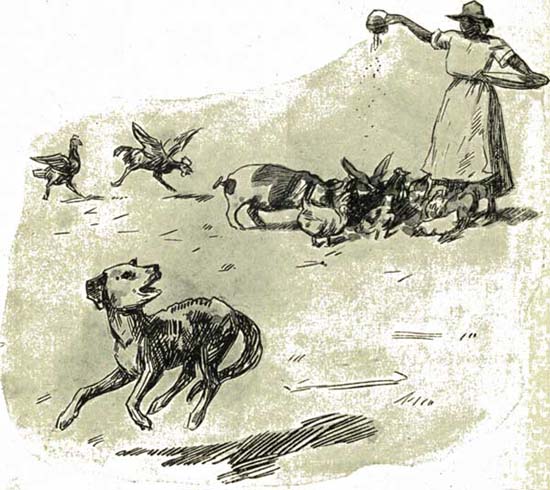

Br'er Bat flaps out in de gloomin' dark,
An' even ef he's boun' for a harmless lark,
He favors de devil an' he keeps sech hours
Dat he seems in cahoot wid de evil powers.
An' he ain't by 'isself in dat, in dat—
An' he ain't by 'isself in dat.
[Pg 92]

Dem inkybator chickens dat's hatched by de clock,
Wid a lamp for love, is lonesome stock;
Dey feeds in droves, but dey envies de others
Dat scratches for grubs wid any ol' mothers.
An' dey ain't by deyselves, po' orphans, in dat—
No, dey ain't by deyselves in dat.
[Pg 93]
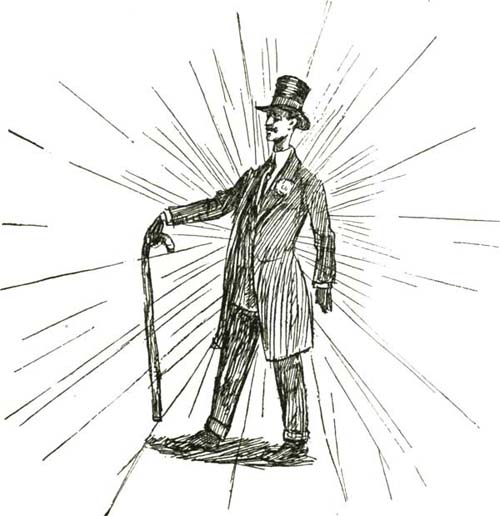
Br'er Lightnin'-bug is a gay yo'ng spark,
But he nuver is yit put out de dark;
He shines for 'isself in 'is zigzag flight,
An' he's middlin' sho he's de sou'ce of light.
But he ain't by 'isself in dat, in dat—
But he ain't by 'isself in dat.
[Pg 94]
De thistle-stalk sends up a noble bloom
Wid de shape of a flower an' de thought of a plume,
But its prickle-y ways turn friendship down;
So it stands all alone, in its velvet gown.
An' it ain't by its lonesome self in dat—
No, it ain't by itself in dat.
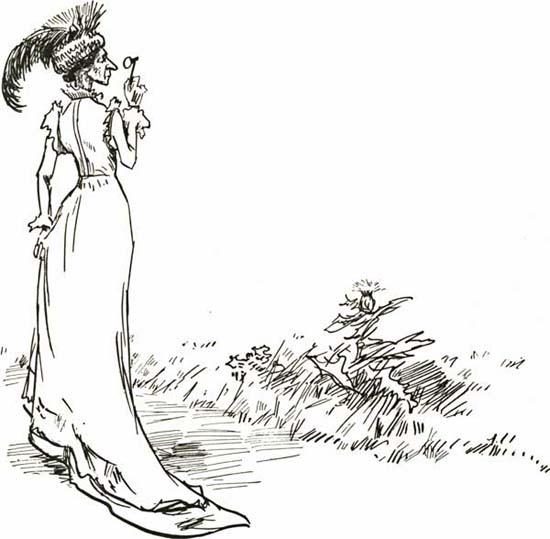
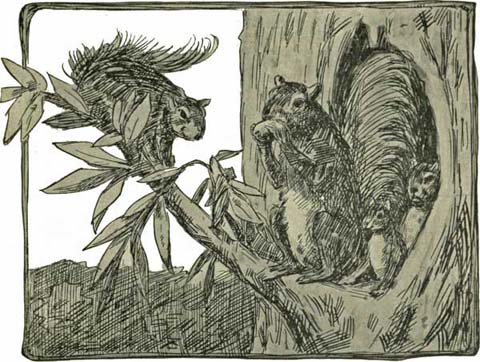
De gray squir'l lives a nachel life,
Wid friends an' foes an' chillen an' wife;
But whenever he gits his picture took,
He snatches dat nut, to appear in de book.
But he ain't by 'isself in dat, in dat—
But he ain't by 'isself in dat.
[Pg 96]
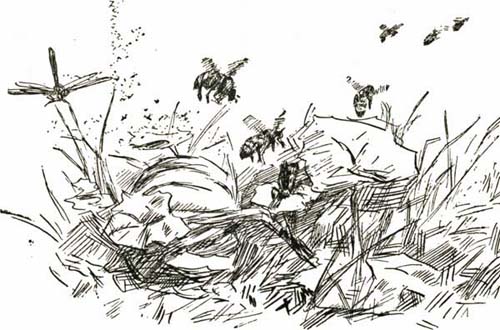
Look out for Mister Bee in de punkin-flower!
Plenty gallinippers in de grass!
Mighty close tie 'twix' wings an' stings
Better let de honey-bee pass!
Z—Z—Z, Z, Z!
Better let de honey-bee pass!
White-face bumblebee—white folks' ways—
Never give a sassy answer back!
But don't you trus' de black-face, no matter what he says!
Give de nigger bumblebee de track!
Z—Z—Z, Z, Z!
Give de nigger bumblebee de track![2]
When Sis' Rose th'ows open her heart too proud, | |
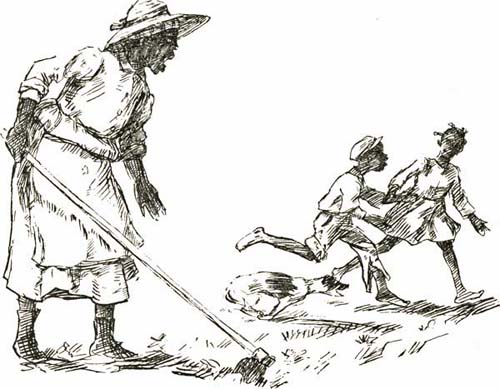
Dey say Sis' Ingine's fiercest scream
Don't mean nothin' but lettin' off steam,
But wid so much wrackage behin' 'er back,
Seem like she say: "Git out o' my track!"
An' she ain't by 'erself, old Mis, in dat—
No, she ain't by 'erself in dat.
[Pg 99]
No matter how much she strive to 'spire,
Sis' Nannie Goat's measured 'g'inst some'h'n' higher;
"First cousin to a sheep" an' "de po' man's cow,"
Is hol'-down luck, come when, come how.
An' she ain't by 'erself helt down like dat—
No, she ain't by 'erself in dat.
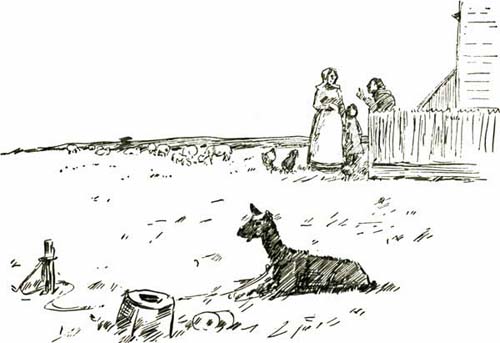
| |
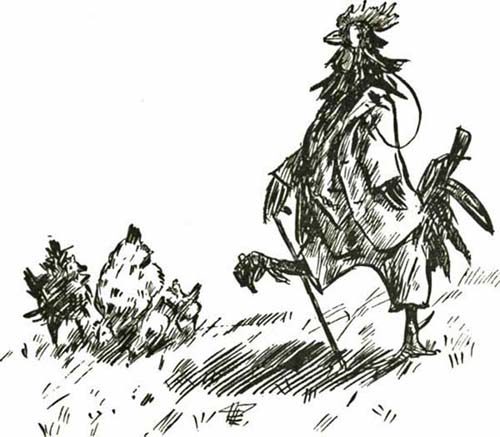
Dat frizzledy chicken, he steps so spry,
An' he totes 'is head so pompious high,
Like as ef he tries, wharever he goes,
To rise above dem rough-dried clo'es.
An' he ain't by 'isself in dat, in dat—
An' he ain't by 'isself in dat.
[Pg 102]
Oh, I used to sing a song,
An' dey said it was too long,
So I cut it off de en'
To accommodate a frien'
Nex' do', nex' do'—
To accommodate a frien' nex' do'.
But it made de matter wuss
Dan it had been at de fus,
'Ca'ze de en' was gone, an' den
Co'se it didn't have no en'
Any mo', any mo'—
Oh, it didn't have no en' any mo'!
So, to save my frien' from sinnin',
I cut off de song's beginnin';
Still he cusses right along
Whilst I sings about my song
Jes so, jes so—
Whilst I sings about my song jes so.
How to please 'im is my riddle,
So I'll fall back on my fiddle;
For I'd stan' myself on en'
To accommodate a frien'
Nex' do', nex' do'—
To accommodate a frien' nex' do'.
[Pg 103]
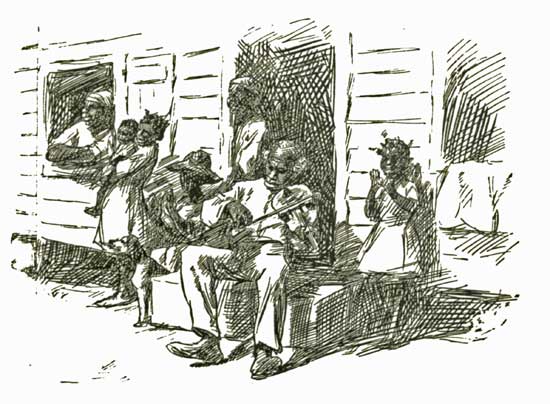
| |
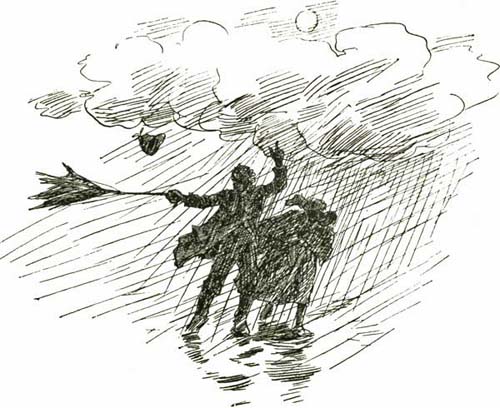
Br'er Rain-crow sho kin prophesy,
Caze he reads his wisdom f'om de page on high;
His mind ain't clogged wid secon'-hand facts,
But de moon an' de skies is his almanacs.
An' he ain't by 'isself in dat, in dat—
An' he ain't by 'isself in dat.
[Pg 106]
| |
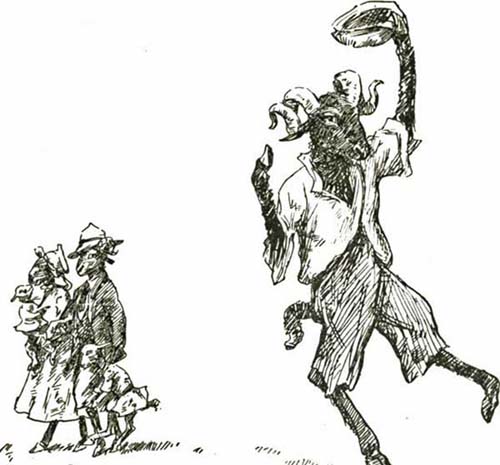
De black sheep says, "Oh, what's de use
To shun de mire an' de muddy sluice?
For whether I walks for praise or blame,
Dey'll call me 'black sheep,' jes de same!"
An' he ain't by 'isself in dat, in dat—
An' he ain't by 'isself in dat.
[Pg 108]
Dat Berkshire horg in de blue ribbon pen
Come home wid de heavy-weight prize again;
He looks mighty pompious in 'is stall,
But he's on'y a fat horg, after all.
An' he ain't by 'isself in dat, in dat—
An' he ain't by 'isself in dat.
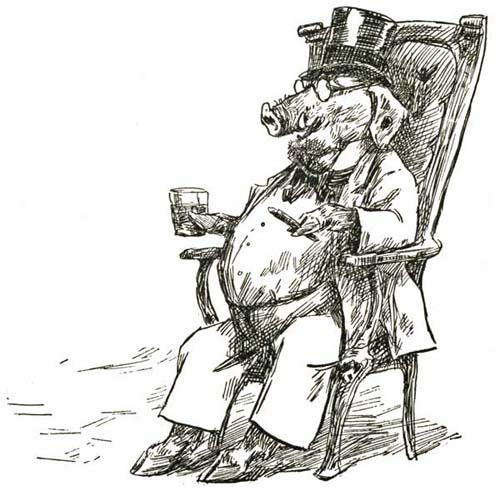
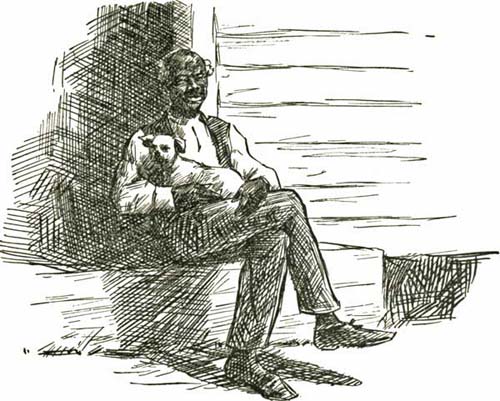
I can't talk dog an' he can't talk man,
Yit Rover an' me, we onderstan';
I wag my tongue an' he wags 'is tail,
An' Love explains whar grammars fail.
An' we ain't by ourselves in dat, in dat—
No, we ain't by ourselves in dat.
[Pg 110]
[1] The guinea-fowl strays away from home and makes her nest in the fields. The newly hatched guinea-chicks are beautiful, dainty things, with coral-colored feet which look very fine. The guinea's cry, loud and harsh, sounds like "Potterack!" or "Poor trash!"
[2] The white-faced bee does not sting.
End of the Project Gutenberg EBook of Daddy Do-Funny's Wisdom Jingles, by
Ruth McEnery Stuart
*** END OF THIS PROJECT GUTENBERG EBOOK DADDY DO-FUNNY'S WISDOM JINGLES ***
***** This file should be named 19363-h.htm or 19363-h.zip *****
This and all associated files of various formats will be found in:
http://www.gutenberg.org/1/9/3/6/19363/
Produced by Janet Blenkinship and The Online Distributed
Proofreading Team at http://www.pgdp.net (This file was
produced from images generously made available by The
Internet Archive/American Libraries.)
Updated editions will replace the previous one--the old editions
will be renamed.
Creating the works from public domain print editions means that no
one owns a United States copyright in these works, so the Foundation
(and you!) can copy and distribute it in the United States without
permission and without paying copyright royalties. Special rules,
set forth in the General Terms of Use part of this license, apply to
copying and distributing Project Gutenberg-tm electronic works to
protect the PROJECT GUTENBERG-tm concept and trademark. Project
Gutenberg is a registered trademark, and may not be used if you
charge for the eBooks, unless you receive specific permission. If you
do not charge anything for copies of this eBook, complying with the
rules is very easy. You may use this eBook for nearly any purpose
such as creation of derivative works, reports, performances and
research. They may be modified and printed and given away--you may do
practically ANYTHING with public domain eBooks. Redistribution is
subject to the trademark license, especially commercial
redistribution.
*** START: FULL LICENSE ***
THE FULL PROJECT GUTENBERG LICENSE
PLEASE READ THIS BEFORE YOU DISTRIBUTE OR USE THIS WORK
To protect the Project Gutenberg-tm mission of promoting the free
distribution of electronic works, by using or distributing this work
(or any other work associated in any way with the phrase "Project
Gutenberg"), you agree to comply with all the terms of the Full Project
Gutenberg-tm License (available with this file or online at
http://gutenberg.org/license).
Section 1. General Terms of Use and Redistributing Project Gutenberg-tm
electronic works
1.A. By reading or using any part of this Project Gutenberg-tm
electronic work, you indicate that you have read, understand, agree to
and accept all the terms of this license and intellectual property
(trademark/copyright) agreement. If you do not agree to abide by all
the terms of this agreement, you must cease using and return or destroy
all copies of Project Gutenberg-tm electronic works in your possession.
If you paid a fee for obtaining a copy of or access to a Project
Gutenberg-tm electronic work and you do not agree to be bound by the
terms of this agreement, you may obtain a refund from the person or
entity to whom you paid the fee as set forth in paragraph 1.E.8.
1.B. "Project Gutenberg" is a registered trademark. It may only be
used on or associated in any way with an electronic work by people who
agree to be bound by the terms of this agreement. There are a few
things that you can do with most Project Gutenberg-tm electronic works
even without complying with the full terms of this agreement. See
paragraph 1.C below. There are a lot of things you can do with Project
Gutenberg-tm electronic works if you follow the terms of this agreement
and help preserve free future access to Project Gutenberg-tm electronic
works. See paragraph 1.E below.
1.C. The Project Gutenberg Literary Archive Foundation ("the Foundation"
or PGLAF), owns a compilation copyright in the collection of Project
Gutenberg-tm electronic works. Nearly all the individual works in the
collection are in the public domain in the United States. If an
individual work is in the public domain in the United States and you are
located in the United States, we do not claim a right to prevent you from
copying, distributing, performing, displaying or creating derivative
works based on the work as long as all references to Project Gutenberg
are removed. Of course, we hope that you will support the Project
Gutenberg-tm mission of promoting free access to electronic works by
freely sharing Project Gutenberg-tm works in compliance with the terms of
this agreement for keeping the Project Gutenberg-tm name associated with
the work. You can easily comply with the terms of this agreement by
keeping this work in the same format with its attached full Project
Gutenberg-tm License when you share it without charge with others.
1.D. The copyright laws of the place where you are located also govern
what you can do with this work. Copyright laws in most countries are in
a constant state of change. If you are outside the United States, check
the laws of your country in addition to the terms of this agreement
before downloading, copying, displaying, performing, distributing or
creating derivative works based on this work or any other Project
Gutenberg-tm work. The Foundation makes no representations concerning
the copyright status of any work in any country outside the United
States.
1.E. Unless you have removed all references to Project Gutenberg:
1.E.1. The following sentence, with active links to, or other immediate
access to, the full Project Gutenberg-tm License must appear prominently
whenever any copy of a Project Gutenberg-tm work (any work on which the
phrase "Project Gutenberg" appears, or with which the phrase "Project
Gutenberg" is associated) is accessed, displayed, performed, viewed,
copied or distributed:
This eBook is for the use of anyone anywhere at no cost and with
almost no restrictions whatsoever. You may copy it, give it away or
re-use it under the terms of the Project Gutenberg License included
with this eBook or online at www.gutenberg.org
1.E.2. If an individual Project Gutenberg-tm electronic work is derived
from the public domain (does not contain a notice indicating that it is
posted with permission of the copyright holder), the work can be copied
and distributed to anyone in the United States without paying any fees
or charges. If you are redistributing or providing access to a work
with the phrase "Project Gutenberg" associated with or appearing on the
work, you must comply either with the requirements of paragraphs 1.E.1
through 1.E.7 or obtain permission for the use of the work and the
Project Gutenberg-tm trademark as set forth in paragraphs 1.E.8 or
1.E.9.
1.E.3. If an individual Project Gutenberg-tm electronic work is posted
with the permission of the copyright holder, your use and distribution
must comply with both paragraphs 1.E.1 through 1.E.7 and any additional
terms imposed by the copyright holder. Additional terms will be linked
to the Project Gutenberg-tm License for all works posted with the
permission of the copyright holder found at the beginning of this work.
1.E.4. Do not unlink or detach or remove the full Project Gutenberg-tm
License terms from this work, or any files containing a part of this
work or any other work associated with Project Gutenberg-tm.
1.E.5. Do not copy, display, perform, distribute or redistribute this
electronic work, or any part of this electronic work, without
prominently displaying the sentence set forth in paragraph 1.E.1 with
active links or immediate access to the full terms of the Project
Gutenberg-tm License.
1.E.6. You may convert to and distribute this work in any binary,
compressed, marked up, nonproprietary or proprietary form, including any
word processing or hypertext form. However, if you provide access to or
distribute copies of a Project Gutenberg-tm work in a format other than
"Plain Vanilla ASCII" or other format used in the official version
posted on the official Project Gutenberg-tm web site (www.gutenberg.org),
you must, at no additional cost, fee or expense to the user, provide a
copy, a means of exporting a copy, or a means of obtaining a copy upon
request, of the work in its original "Plain Vanilla ASCII" or other
form. Any alternate format must include the full Project Gutenberg-tm
License as specified in paragraph 1.E.1.
1.E.7. Do not charge a fee for access to, viewing, displaying,
performing, copying or distributing any Project Gutenberg-tm works
unless you comply with paragraph 1.E.8 or 1.E.9.
1.E.8. You may charge a reasonable fee for copies of or providing
access to or distributing Project Gutenberg-tm electronic works provided
that
- You pay a royalty fee of 20% of the gross profits you derive from
the use of Project Gutenberg-tm works calculated using the method
you already use to calculate your applicable taxes. The fee is
owed to the owner of the Project Gutenberg-tm trademark, but he
has agreed to donate royalties under this paragraph to the
Project Gutenberg Literary Archive Foundation. Royalty payments
must be paid within 60 days following each date on which you
prepare (or are legally required to prepare) your periodic tax
returns. Royalty payments should be clearly marked as such and
sent to the Project Gutenberg Literary Archive Foundation at the
address specified in Section 4, "Information about donations to
the Project Gutenberg Literary Archive Foundation."
- You provide a full refund of any money paid by a user who notifies
you in writing (or by e-mail) within 30 days of receipt that s/he
does not agree to the terms of the full Project Gutenberg-tm
License. You must require such a user to return or
destroy all copies of the works possessed in a physical medium
and discontinue all use of and all access to other copies of
Project Gutenberg-tm works.
- You provide, in accordance with paragraph 1.F.3, a full refund of any
money paid for a work or a replacement copy, if a defect in the
electronic work is discovered and reported to you within 90 days
of receipt of the work.
- You comply with all other terms of this agreement for free
distribution of Project Gutenberg-tm works.
1.E.9. If you wish to charge a fee or distribute a Project Gutenberg-tm
electronic work or group of works on different terms than are set
forth in this agreement, you must obtain permission in writing from
both the Project Gutenberg Literary Archive Foundation and Michael
Hart, the owner of the Project Gutenberg-tm trademark. Contact the
Foundation as set forth in Section 3 below.
1.F.
1.F.1. Project Gutenberg volunteers and employees expend considerable
effort to identify, do copyright research on, transcribe and proofread
public domain works in creating the Project Gutenberg-tm
collection. Despite these efforts, Project Gutenberg-tm electronic
works, and the medium on which they may be stored, may contain
"Defects," such as, but not limited to, incomplete, inaccurate or
corrupt data, transcription errors, a copyright or other intellectual
property infringement, a defective or damaged disk or other medium, a
computer virus, or computer codes that damage or cannot be read by
your equipment.
1.F.2. LIMITED WARRANTY, DISCLAIMER OF DAMAGES - Except for the "Right
of Replacement or Refund" described in paragraph 1.F.3, the Project
Gutenberg Literary Archive Foundation, the owner of the Project
Gutenberg-tm trademark, and any other party distributing a Project
Gutenberg-tm electronic work under this agreement, disclaim all
liability to you for damages, costs and expenses, including legal
fees. YOU AGREE THAT YOU HAVE NO REMEDIES FOR NEGLIGENCE, STRICT
LIABILITY, BREACH OF WARRANTY OR BREACH OF CONTRACT EXCEPT THOSE
PROVIDED IN PARAGRAPH F3. YOU AGREE THAT THE FOUNDATION, THE
TRADEMARK OWNER, AND ANY DISTRIBUTOR UNDER THIS AGREEMENT WILL NOT BE
LIABLE TO YOU FOR ACTUAL, DIRECT, INDIRECT, CONSEQUENTIAL, PUNITIVE OR
INCIDENTAL DAMAGES EVEN IF YOU GIVE NOTICE OF THE POSSIBILITY OF SUCH
DAMAGE.
1.F.3. LIMITED RIGHT OF REPLACEMENT OR REFUND - If you discover a
defect in this electronic work within 90 days of receiving it, you can
receive a refund of the money (if any) you paid for it by sending a
written explanation to the person you received the work from. If you
received the work on a physical medium, you must return the medium with
your written explanation. The person or entity that provided you with
the defective work may elect to provide a replacement copy in lieu of a
refund. If you received the work electronically, the person or entity
providing it to you may choose to give you a second opportunity to
receive the work electronically in lieu of a refund. If the second copy
is also defective, you may demand a refund in writing without further
opportunities to fix the problem.
1.F.4. Except for the limited right of replacement or refund set forth
in paragraph 1.F.3, this work is provided to you 'AS-IS' WITH NO OTHER
WARRANTIES OF ANY KIND, EXPRESS OR IMPLIED, INCLUDING BUT NOT LIMITED TO
WARRANTIES OF MERCHANTIBILITY OR FITNESS FOR ANY PURPOSE.
1.F.5. Some states do not allow disclaimers of certain implied
warranties or the exclusion or limitation of certain types of damages.
If any disclaimer or limitation set forth in this agreement violates the
law of the state applicable to this agreement, the agreement shall be
interpreted to make the maximum disclaimer or limitation permitted by
the applicable state law. The invalidity or unenforceability of any
provision of this agreement shall not void the remaining provisions.
1.F.6. INDEMNITY - You agree to indemnify and hold the Foundation, the
trademark owner, any agent or employee of the Foundation, anyone
providing copies of Project Gutenberg-tm electronic works in accordance
with this agreement, and any volunteers associated with the production,
promotion and distribution of Project Gutenberg-tm electronic works,
harmless from all liability, costs and expenses, including legal fees,
that arise directly or indirectly from any of the following which you do
or cause to occur: (a) distribution of this or any Project Gutenberg-tm
work, (b) alteration, modification, or additions or deletions to any
Project Gutenberg-tm work, and (c) any Defect you cause.
Section 2. Information about the Mission of Project Gutenberg-tm
Project Gutenberg-tm is synonymous with the free distribution of
electronic works in formats readable by the widest variety of computers
including obsolete, old, middle-aged and new computers. It exists
because of the efforts of hundreds of volunteers and donations from
people in all walks of life.
Volunteers and financial support to provide volunteers with the
assistance they need, is critical to reaching Project Gutenberg-tm's
goals and ensuring that the Project Gutenberg-tm collection will
remain freely available for generations to come. In 2001, the Project
Gutenberg Literary Archive Foundation was created to provide a secure
and permanent future for Project Gutenberg-tm and future generations.
To learn more about the Project Gutenberg Literary Archive Foundation
and how your efforts and donations can help, see Sections 3 and 4
and the Foundation web page at http://www.pglaf.org.
Section 3. Information about the Project Gutenberg Literary Archive
Foundation
The Project Gutenberg Literary Archive Foundation is a non profit
501(c)(3) educational corporation organized under the laws of the
state of Mississippi and granted tax exempt status by the Internal
Revenue Service. The Foundation's EIN or federal tax identification
number is 64-6221541. Its 501(c)(3) letter is posted at
http://pglaf.org/fundraising. Contributions to the Project Gutenberg
Literary Archive Foundation are tax deductible to the full extent
permitted by U.S. federal laws and your state's laws.
The Foundation's principal office is located at 4557 Melan Dr. S.
Fairbanks, AK, 99712., but its volunteers and employees are scattered
throughout numerous locations. Its business office is located at
809 North 1500 West, Salt Lake City, UT 84116, (801) 596-1887, email
business@pglaf.org. Email contact links and up to date contact
information can be found at the Foundation's web site and official
page at http://pglaf.org
For additional contact information:
Dr. Gregory B. Newby
Chief Executive and Director
gbnewby@pglaf.org
Section 4. Information about Donations to the Project Gutenberg
Literary Archive Foundation
Project Gutenberg-tm depends upon and cannot survive without wide
spread public support and donations to carry out its mission of
increasing the number of public domain and licensed works that can be
freely distributed in machine readable form accessible by the widest
array of equipment including outdated equipment. Many small donations
($1 to $5,000) are particularly important to maintaining tax exempt
status with the IRS.
The Foundation is committed to complying with the laws regulating
charities and charitable donations in all 50 states of the United
States. Compliance requirements are not uniform and it takes a
considerable effort, much paperwork and many fees to meet and keep up
with these requirements. We do not solicit donations in locations
where we have not received written confirmation of compliance. To
SEND DONATIONS or determine the status of compliance for any
particular state visit http://pglaf.org
While we cannot and do not solicit contributions from states where we
have not met the solicitation requirements, we know of no prohibition
against accepting unsolicited donations from donors in such states who
approach us with offers to donate.
International donations are gratefully accepted, but we cannot make
any statements concerning tax treatment of donations received from
outside the United States. U.S. laws alone swamp our small staff.
Please check the Project Gutenberg Web pages for current donation
methods and addresses. Donations are accepted in a number of other
ways including checks, online payments and credit card donations.
To donate, please visit: http://pglaf.org/donate
Section 5. General Information About Project Gutenberg-tm electronic
works.
Professor Michael S. Hart is the originator of the Project Gutenberg-tm
concept of a library of electronic works that could be freely shared
with anyone. For thirty years, he produced and distributed Project
Gutenberg-tm eBooks with only a loose network of volunteer support.
Project Gutenberg-tm eBooks are often created from several printed
editions, all of which are confirmed as Public Domain in the U.S.
unless a copyright notice is included. Thus, we do not necessarily
keep eBooks in compliance with any particular paper edition.
Most people start at our Web site which has the main PG search facility:
http://www.gutenberg.org
This Web site includes information about Project Gutenberg-tm,
including how to make donations to the Project Gutenberg Literary
Archive Foundation, how to help produce our new eBooks, and how to
subscribe to our email newsletter to hear about new eBooks.